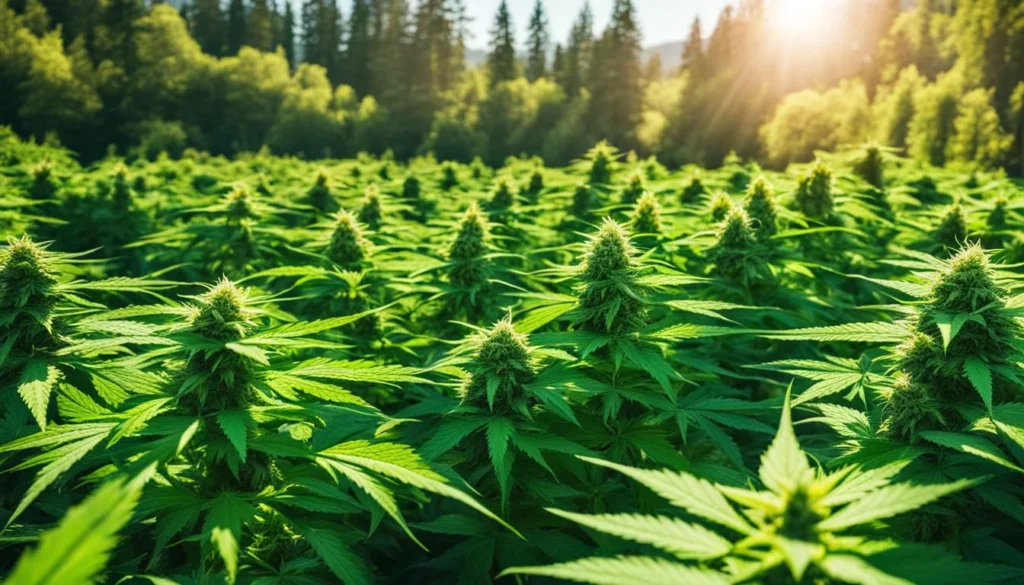The legalization of marijuana has sparked a revolution in America, with the cannabis industry experiencing rapid growth and the stigma around cannabis slowly disappearing. As a result, the weed revolution has become a significant topic of discussion, the impact of which extends far beyond just the business world.

Several states have legalized the recreational use of marijuana, and many more have legalized medical usage. As this trend continues to gain momentum, it is becoming increasingly clear that America is at the forefront of the cannabis revolution.
Key Takeaways:
- The legalization of marijuana has sparked a revolution in America.
- The cannabis industry is experiencing rapid growth and the stigma around cannabis is slowly disappearing.
- Several states have legalized the recreational use of marijuana, and many more have legalized medical usage.
- America is at the forefront of the cannabis revolution.
- The impact of the weed revolution extends far beyond just the business world.
The Changing Perception of Cannabis
For years, cannabis was demonized and stigmatized as a dangerous drug. But in recent times, there has been a shift in public opinion towards cannabis. What was once viewed as a gateway drug is now being embraced as part of a cultural movement.
The changing perception of cannabis can be attributed to the development of weed culture and the marijuana movement. Weed culture is a subculture that has developed around the use of cannabis, and it encompasses everything from art and music to fashion and food. The marijuana movement, on the other hand, is a political and social movement that advocates for the legalization of marijuana and the decriminalization of its use.
This cultural shift has led to a broader acceptance of cannabis use and an increase in its popularity. Nowadays, you can find cannabis products in a variety of forms, including edibles, concentrates, and topicals. You can also find cannabis-infused beverages and foods at specialized events and restaurants.
The rise of weed culture and the marijuana movement has created a platform for individuals to share their experiences and support one another in their love for cannabis. It has also helped break down the stigma surrounding cannabis use and promote more open and honest conversations about its benefits and drawbacks.
The Role of Media
The media has played a vital role in shaping public opinion towards cannabis. In recent years, there has been an increase in media coverage of the cannabis industry, from news stories about legalization efforts to documentaries that explore the cultural and economic impact of cannabis.
Through the media’s depiction of cannabis, people have been able to learn about the many benefits and potential drawbacks of cannabis use. They have also been able to see how cannabis is being integrated into mainstream society and how it is benefiting various industries, including healthcare, beauty, and hospitality.
The media has also helped to spread awareness about the social and political issues surrounding cannabis, including the disproportionate impact of drug laws on marginalized communities and the need for comprehensive drug policy reform.
The Health Benefits of Cannabis
If you are interested in the cannabis economy or the marijuana market, you should know that cannabis has gained a reputation as a wonder drug with numerous health benefits. The use of cannabis for medicinal purposes dates back to ancient times, but recent scientific research has shed light on the potential of cannabis in treating a range of medical conditions.
One of the most well-known health benefits associated with cannabis is its ability to alleviate chronic pain. Cannabis contains compounds called cannabinoids that interact with the body’s endocannabinoid system to provide pain relief. In fact, cannabis is often used as an alternative to opioids for pain management, as it is less addictive and has fewer side effects.
But the medical benefits of cannabis go beyond pain relief. Studies have shown that it can help in treating anxiety, depression, and PTSD. Cannabis also has anti-inflammatory properties and may be effective in treating conditions such as Crohn’s disease and multiple sclerosis.
The emerging cannabis economy and marijuana market are also playing a significant role in the research and development of new cannabis-based products for medical use. With the legalization of cannabis, there has been a surge of interest in the industry, and companies are investing heavily in research and development to uncover new medical applications for cannabis.
As more research is conducted, the potential benefits of cannabis in treating a range of medical conditions continue to emerge. With the cannabis revolution in full swing, the future looks bright for the cannabis industry and the marijuana market.
The Economic Impact of Marijuana Legalization
The legalization of marijuana has led to a cannabis revolution, with widespread support for the development of the cannabis industry. As a result, the cannabis business is growing at a rapid pace, generating significant economic opportunities and contributing to job growth across the United States.
The cannabis revolution has had a major impact on both local and state economies. The marijuana market has generated billions in tax revenues, funding various government programs and initiatives. This newfound revenue stream has also helped to alleviate budgetary strains in several states, paving the way for increased investment in education, healthcare, and infrastructure.
The cannabis economy has also created numerous job opportunities throughout the country. From cultivators to processors to dispensary owners, the cannabis industry is creating jobs at a rate faster than any other industry, with an estimated 211,000 jobs created in 2019 alone. This growth is expected to continue in the coming years, as more states legalize marijuana and the cannabis industry expands.
However, the cannabis revolution is not without its challenges. Despite being legalized in several states, marijuana remains illegal under federal law, creating obstacles for cannabis businesses, particularly in regards to banking and financing. Additionally, lingering stigmas surrounding marijuana and the cannabis industry have created barriers to entry for some entrepreneurs, particularly those from marginalized communities.
Despite these challenges, the cannabis revolution shows no signs of slowing down. As the industry continues to grow and expand, it will be essential for policymakers to address these issues to ensure that the cannabis revolution continues to benefit the economy and provide opportunities for all.
State-by-State Marijuana Legislation
If you are interested in cannabis, it is important to know the regulations in the state you are in or traveling to. While marijuana remains illegal at the federal level, individual states have taken varying approaches to legalization and regulation.
Legalization Status
As of 2021, recreational marijuana use is legal in 17 states and the District of Columbia, while medical marijuana is legal in 36 states and the District of Columbia. However, it is important to note that each state has its own restrictions and regulations around cultivation, possession, and sales.
Restrictions and Regulations
In some states, such as Alaska and California, adults over the age of 21 can possess up to one ounce of marijuana and grow up to six plants for personal use. In other states, such as Michigan and Illinois, adults can possess larger amounts and can purchase marijuana from licensed dispensaries.
It is important to note that even in states where marijuana is legal, there are still restrictions on where it can be used. For example, in Colorado, smoking marijuana is prohibited in public places such as parks and restaurants. Additionally, employers can still enforce drug testing and prohibit marijuana use by employees.
Future of Marijuana Legalization
As public opinion continues to shift towards support for marijuana legalization, it is likely more states will follow suit. In fact, several states are currently considering legalization measures, including New York and New Jersey.
However, it remains to be seen how the federal government will respond to these developments. While cannabis reform has been proposed in Congress, it has yet to be passed into law, leaving the industry in a legal grey area.
The Rise of Cannabis Startups
If you’re looking to get into the marijuana market, starting a cannabis business may be your best bet. The industry is booming, and new opportunities are emerging every day.
One significant factor contributing to the growth of the industry is the rise of cannabis startups. These companies are disrupting traditional industries, bringing innovative ideas and approaches to the market.
Some cannabis startups are focused on technology, developing software and apps to streamline processes, provide better data analysis, and improve customer experiences. Others are carving out niches in specific areas, such as cannabis-infused foods and beverages or CBD products.
If you’re considering starting a cannabis business, it’s essential to do your research. The industry is highly regulated, and laws vary by state, so you need to understand the legal landscape and comply with all regulations.
Some challenges facing cannabis startups include limited access to banking services and the ongoing federal prohibition of marijuana. However, many entrepreneurs are finding ways to overcome these obstacles, setting their businesses up for success.
One way to stay on top of the latest developments in the marijuana market is to attend industry events and conferences. This is an excellent opportunity to network with other entrepreneurs, learn from industry experts, and stay up-to-date on the latest trends.
As the cannabis industry continues to grow, the role of cannabis startups will become increasingly important. These companies are driving innovation, creating jobs, and contributing to the overall success of the industry.
Cannabis and Social Justice
The marijuana movement is not just about weed culture and the cannabis revolution; it is also about social justice. The War on Drugs has disproportionately affected communities of color, leading to high arrest rates and harsher sentences for drug-related offenses. This is despite studies showing that drug use rates are similar across racial lines.
The impact of these drug laws has been devastating, with many people facing long-term consequences for nonviolent drug offenses. For example, a drug conviction can lead to difficulties finding employment, housing, and education.
Efforts are being made to address these injustices, with some states enacting policies such as expungement of past marijuana-related offenses and prioritizing equity in the cannabis industry. However, there is still much work to be done to rectify the harm caused by decades of unjust drug laws.
It is important to recognize the intersection of cannabis and social justice in the broader cannabis revolution. By acknowledging and addressing the injustices of the past, we can create a more equitable and just future for all members of society.

The Future of Cannabis Research
As the cannabis industry continues to grow, the importance of ongoing research and development becomes increasingly clear. While many benefits of cannabis have already been discovered, there is still much to learn about this versatile plant, and ongoing research will likely reveal even more ways in which cannabis can be utilized.
One area that is ripe for exploration is the potential medical uses of cannabis. While many people have already benefited from using cannabis to alleviate symptoms of various medical conditions, ongoing research may reveal further ways in which cannabis can be used to improve health outcomes for a wide range of conditions.
Another area of interest for research is the development of new strains of cannabis that can be tailored to specific needs. This could include strains with specific ratios of THC and CBD, or strains that are better suited for certain medical conditions.
Additionally, ongoing research may reveal new ways in which cannabis can be used in different industries beyond just medicinal or recreational use. For example, research into the use of cannabis as a building material or textile could unlock new ways to produce sustainable and eco-friendly products.
Overall, as the cannabis industry continues to mature, ongoing research will be critical in driving innovation and unlocking the full potential of this amazing plant. Whether you are a business owner in the cannabis industry or simply someone interested in the future of cannabis research, staying up-to-date on the latest developments and breakthroughs will be essential in driving progress in the years to come.
Cannabis Tourism and Events
As cannabis legalization continues to spread, more and more destinations are marketing themselves as cannabis-friendly, drawing in visitors from around the world who are eager to explore the latest offerings of the cannabis industry.
From cannabis-themed festivals to guided dispensary tours, there are plenty of ways to engage with weed culture and learn more about the cannabis economy. Cannabis-friendly accommodations are also on the rise, including hotels that offer in-room vaporizers and cannabis-infused snacks.
One popular destination for cannabis tourism is Colorado, which has seen a surge in visitors since legalizing recreational marijuana in 2014. The city of Denver alone has more than 100 cannabis dispensaries, and there are numerous cannabis-focused events throughout the year, such as the 420 Festival.
California is also a major destination for cannabis enthusiasts, with a plethora of events throughout the state, including the Emerald Cup, a popular cannabis competition held annually in Santa Rosa. Visitors to California can also enjoy cannabis-infused dinners, spa treatments, and even yoga classes.
As cannabis tourism continues to grow, it is having a significant impact on the cannabis economy, generating significant revenue for both businesses and local governments. However, as with any emerging industry, there are also challenges to be faced, including ensuring safe and responsible use, navigating complex regulations, and combating the lingering stigma associated with cannabis use.
Despite these obstacles, cannabis tourism and events are becoming increasingly mainstream, providing a unique opportunity for travelers to explore the world of weed culture and experience the emerging cannabis economy firsthand.
The International Impact of the Weed Revolution
The impact of the weed revolution extends beyond American borders, shaping international perspectives on marijuana legalization and influencing global cannabis policies. While the United States has been at the forefront of the cannabis industry, other countries are beginning to follow suit and embrace the benefits of marijuana legalization.
Canada, for example, legalized recreational marijuana in 2018, becoming the second country in the world to do so after Uruguay. Other countries, such as Mexico and Luxembourg, are poised to follow in their footsteps, with lawmakers working to draft legislation for marijuana legalization.
The cannabis revolution has also had a significant impact on the global economy. The legal cannabis market is projected to reach a value of $73.6 billion by 2027, with North America accounting for the largest share of the market. This growth has led to the emergence of new job opportunities and the creation of new businesses in the cannabis industry.
However, there are still challenges to be faced in the international cannabis industry, particularly in countries with stricter drug laws and regulations. Despite these obstacles, the global momentum towards marijuana legalization and the growing acceptance of cannabis as a beneficial plant continues to gather pace.
The Role of the United States in Shaping Global Cannabis Policies
The United States, with its thriving cannabis industry and progressive attitudes towards marijuana legalization, has played a significant role in shaping global cannabis policies. The country’s leadership in this area has helped to break down stigmas surrounding cannabis and has encouraged other countries to follow suit.
However, the federal prohibition on marijuana in the United States continues to present challenges for the industry. While states have the power to legalize marijuana, the federal government still considers it a Schedule I drug, making it illegal under federal law. This discrepancy has created a complex legal landscape for the cannabis industry and has limited its growth potential.

The Future of Global Cannabis Policies
As the cannabis industry continues to grow, it is likely that more countries will adopt progressive attitudes towards marijuana legalization. However, there will still be challenges to be faced, particularly in countries with stricter drug laws and regulations.
To ensure the continued growth and success of the global cannabis industry, it is important that lawmakers work towards creating policies that support the industry and its potential for economic growth. This includes addressing issues such as banking restrictions and federal regulations that hinder the industry’s growth potential.
The weed revolution is not just a movement in the United States; it is a global phenomenon that is changing attitudes towards cannabis and shaping international policies. As the cannabis industry continues to grow, it is important to remain mindful of the impact it has on both a national and global scale.
Overcoming Challenges in the Cannabis Business
As the weed revolution continues to impact the cannabis business, there are still significant challenges that the industry faces. One of the most pressing issues is the lack of access to traditional banking services, due to the federal government’s continued classification of marijuana as a Schedule I drug. This has forced many cannabis businesses to operate as cash-only enterprises, creating security risks and making it difficult to scale and grow.
Furthermore, the burden of compliance with ever-changing regulations can be a significant challenge for cannabis businesses. As states continue to legalize marijuana, the rules and regulations governing the cannabis industry can vary widely and require extensive knowledge and resources to navigate successfully. Additionally, the stigma surrounding marijuana can make it difficult for cannabis businesses to obtain funding or partnerships with traditional industries.
However, despite these challenges, those in the cannabis business remain optimistic about the future. Efforts to legalize marijuana at the federal level are gaining momentum, and the industry is continually innovating to find new solutions and opportunities. Cannabis businesses are also joining forces to create industry associations and advocacy groups that can support and protect their interests, helping to overcome some of the challenges they face.
Overcoming obstacles is an inevitable part of any new industry, and the cannabis business is no exception. By addressing these challenges head-on, the industry can continue to grow and thrive in the years to come, further contributing to the ongoing weed revolution.
Conclusion
Congratulations! You’ve made it to the end of the article on the weed revolution in America. Throughout this article, we’ve explored the marijuana legalization movement, how it’s changing the perception of cannabis, and the rise of the cannabis industry.
We’ve delved into the health benefits of cannabis, the economic impact of marijuana legalization, and the state-by-state legislation on marijuana. We’ve also talked about the emergence of cannabis startups and how they are disrupting traditional industries, as well as the intersection of cannabis and social justice.
Furthermore, we discussed the importance of ongoing research in the cannabis industry, the rise of cannabis tourism and events, and the international impact of the weed revolution. Finally, we addressed the challenges that the cannabis industry faces and the efforts made to overcome them.
All of these topics contribute to the broader cultural impact of the weed revolution and the significance of the ongoing cannabis economy and marijuana market. As more and more states legalize marijuana, the cannabis business will continue to thrive, and weed culture will continue to evolve.
The cannabis revolution and marijuana movement are not slowing down any time soon. We’re excited to see what the future holds for America and the international community as they continue to shape cannabis policies and contribute to the emerging cannabis economy.
FAQ
Q: What is the weed revolution?
A: The weed revolution refers to the ongoing movement to legalize and normalize marijuana use, as well as the growth of the cannabis industry.
Q: How is America leading the weed revolution?
A: America is at the forefront of the weed revolution, with several states having legalized marijuana for recreational or medicinal use, and a thriving cannabis industry.
Q: What is the changing perception of cannabis?
A: Cannabis has transitioned from being stigmatized to being embraced as part of a cultural movement, with societal attitudes shifting towards acceptance and normalization.
Q: What are the health benefits of cannabis?
A: Cannabis has shown potential in treating medical conditions such as chronic pain, epilepsy, and nausea, and is being explored for its therapeutic properties.
Q: What is the economic impact of marijuana legalization?
A: The legalization of marijuana has created a thriving industry, generating jobs, tax revenues, and contributing to economic growth.
Q: What are the different marijuana laws across states in America?
A: Marijuana laws vary across states, with some allowing for recreational and medicinal use, while others only permit medical use or have strict regulations in place.
Q: How are cannabis startups disrupting industries?
A: Cannabis startups are disrupting traditional industries by providing innovative products and services, creating new business opportunities in the cannabis sector.
Q: What is the intersection of cannabis and social justice?
A: Cannabis and social justice intersect as the disproportionately affected communities by drug laws are being advocated for, and efforts are being made to rectify past injustices.
Q: Why is ongoing cannabis research important?
A: Ongoing research in the cannabis industry is crucial for uncovering further benefits, understanding potential risks, and driving innovation in the medical and recreational use of cannabis.
Q: What is cannabis tourism?
A: Cannabis tourism refers to travel experiences and events that cater to cannabis enthusiasts, providing opportunities to explore destinations and engage in cannabis-related activities.
Q: How is the weed revolution influencing global perspectives on marijuana?
A: The weed revolution in America is shaping international perspectives on marijuana legalization and influencing the development of cannabis policies worldwide.
Q: What challenges does the cannabis industry face?
A: The cannabis industry faces challenges such as banking restrictions, federal regulations, and lingering stigmas, but efforts are continually being made to overcome these obstacles.



